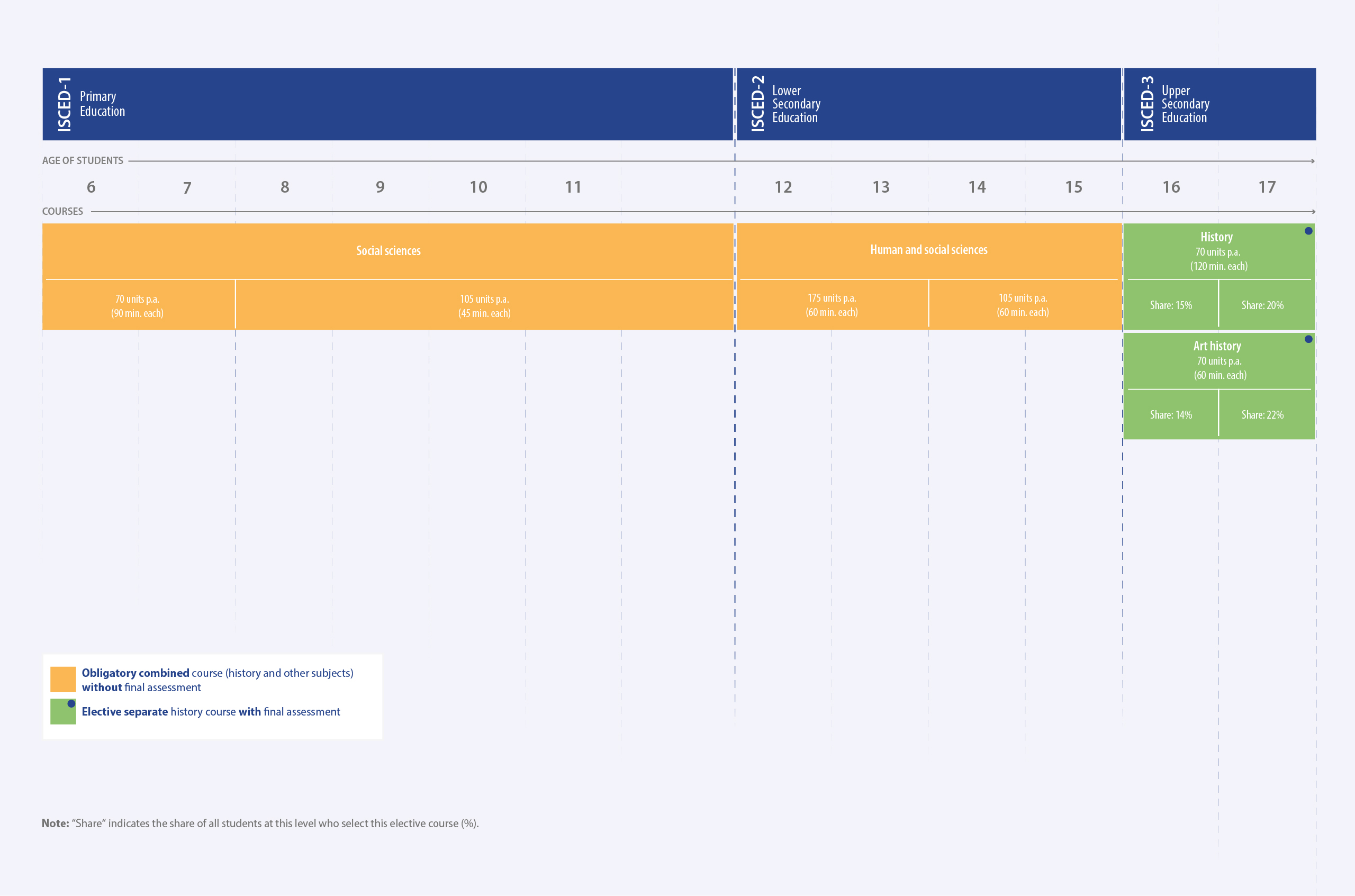
OVERVIEW
There are three school systems operating in Andorra, namely the Andorran, French and Spanish systems. In the Andorran system, history is taught as part of a compulsory multidisciplinary course at the primary and lower secondary levels. History and art history courses are optional for the final two years (upper secondary education, ages 16-17).
The organisation of the curricula is both thematic and competence-based. The curriculum is developed by the Andorran state with the participation of schools, teachers and students. Civil society organisations and minority groups do not participate in this process.
Assessment methods include portfolios, essays, oral presentations/exams, knowledge-based questions, source-based questions and multiple choice questions. Final assessments are compulsory for elective history courses in the 12th grade as part of the state Batxillerat. The approval of educational resources to be used in history teaching takes place at the school level. History teachers are required to complete an initial teacher-training programme at a French or Spanish university and pass an examination administered by the Ministry of Education. In-service professional development courses administered by the Ministry of Education are compulsory and take place on a yearly basis.
Download high-resolution schematic
FURTHER INSIGHTS

HISTORY IN SCHOOL
History is taught as part of the compulsory multidisciplinary courses “Social sciences” and “Human and social sciences” throughout primary and lower secondary education respectively. At upper secondary level, students may take the elective courses “History” and “Art history”, both of which have a final assessment.
As schools follow either the Andorran, French or Spanish curriculum, history is taught in Catalan, French or Spanish respectively. There are two private schools in Andorra, one following the British curriculum and the other the Spanish curriculum. Some schools administered by the Spanish government may have a church affiliation but follow the same curricula as other schools regardless of their affiliation.

HISTORY CURRICULUM
The Andorran state, through the Ministry of Education and Andorran schools, prescribes the Andorran school curriculum, with the participation of the schools, teachers and students. The education authorities report that civil society organisations do not participate in curriculum development. Data on the participation of minority groups in curriculum design are not collected.
|
AIMS REPRESENTED “VERY WELL” OR “QUITE WELL” IN THE CURRICULUM |
PERIODS |
GEOGRAPHICAL SCOPE |
APPROACHES |
|
|
|
|
The authorities report that minority groups (cultural, ethnic, linguistic, national, religious or sexual/gender) are not included in the history curriculum.
Curricula workstation by GEI (History curricula search by country)

ASSESSMENT AND EXAMS
The assessment methods teachers are required to use are portfolios, essays, oral presentations/exams, knowledge-based questions, source-based questions and multiplechoice questions.
End-of-stage examinations are taken at the end of the elective courses on “History” and/or “History of art” in the 12th grade as part of the state Batxillerat, which is set at the national level.
At the lower secondary level, there are continuous assessments (contrôles continus) but no final examinations.
End-of-stage examinations assess the following fields of knowledge: historical content knowledge, historical thinking competences (e.g., critical analysis and evaluation of evidence, formulation and justification of historical arguments, consideration of different perspectives), social and civic competences (e.g., conflict resolution skills, demonstrating empathy, respect for diversity), generic skills (e.g., communication, co-operation, use of ICT).
End-of-stage examinations are oral, written and coursework based. Oral examinations consist of student presentations. Written examinations include open-ended questions, close-ended questions, source-based questions and multiple-choice questions and essays.

TEXTBOOKS AND OTHER RESOURCES
Teachers are allowed to use materials not licensed by the Andorran government without any restrictions. The approval of educational resources to be used in history teaching takes place at the school level. Teaching methodologies are not regulated by the state and the state does not approve or produce textbooks, teaching materials or other resources.
Policies on the use of different types of educational resources are as follows:
|
|
|
International TextbookCat (GEI collection of Textbooks and Educational Media)

HISTORY TEACHERS AND THEIR EDUCATION
History teachers are required to complete an initial teacher-training programme at a French or Spanish university. They are also required to pass an examination administered by the human resources unit of the Ministry of Education. Teachers who obtain a post as a history teacher undergo a probationary period of 10 months, at the end of which they are evaluated by the director of their educational establishment and a national inspector.
Primary school history teachers are trained as teachers of history and of one or more other discipline(s). Secondary school history teachers are trained exclusively or primarily as history teachers.
In-service professional development courses administered by the Ministry of Education are compulsory and take place on a yearly basis. Such courses include training in the methodologies of competence-based pedagogy; content-based training on the history of Andorra for history teachers who did not complete their schooling in Andorra; and training that focuses on the development of ICT skills.
The information in the sections above is an excerpt of the thematic and general data presented in the following OHTE publications:
2022: Pandemics and natural disasters as reflected in history teaching
2023: OHTE General Report on the State of History Teaching in Europe



